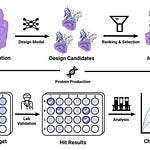Developed by Microsoft Research, BioEmu-1 is a machine learning model designed to predict molecular dynamics (MD) trajectories of proteins, enabling researchers to generate multiple conformational states of a folded protein from a single amino acid sequence6. Unlike traditional tools like AlphaFold2, which predict static structures, BioEmu-1 simulates dynamic behavior critical for understanding protein stability, ligand binding, and allosteric regulation.
Key Innovations
Trajectory Sampling: Generates equilibrium distributions of protein conformations comparable to computationally intensive MD simulations, reducing simulation time from weeks to hours.
Backbone Frame Representation: Outputs simplified protein structures focused on backbone atoms, enabling rapid sampling while requiring post-processing tools like HPacker for side-chain reconstruction6.
Stability Prediction: Validated on benchmark datasets, BioEmu-1 accurately identifies destabilizing mutations by analyzing conformational entropy changes.
Importance
BioEmu-1 addresses the long-standing challenge of capturing protein flexibility, which is essential for drug design. For example, GPCRs and ion channels require dynamic models to identify allosteric binding sites. By providing a computationally efficient alternative to MD simulations, this tool enables high-throughput screening of conformational landscapes, particularly for antibody engineering and enzyme optimization











